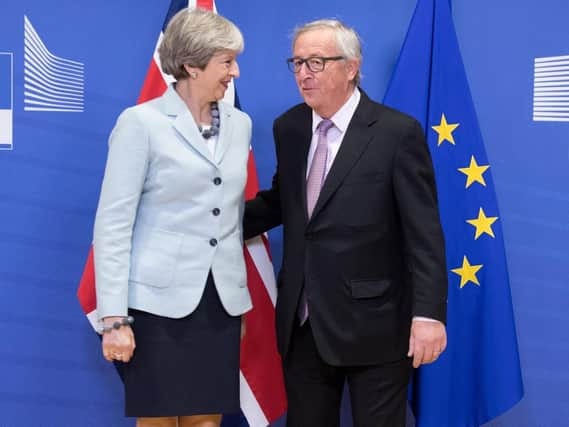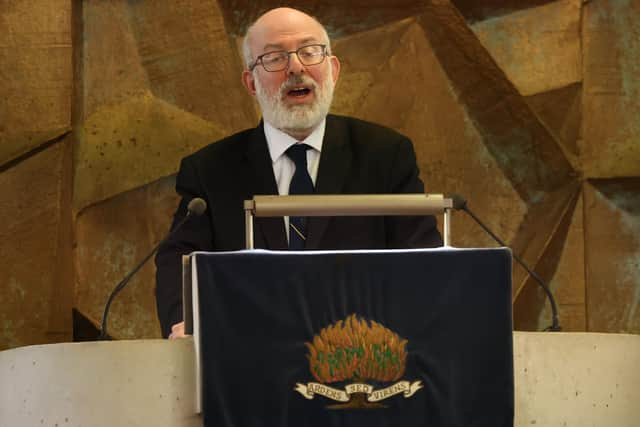Dean Godson and Paul Bew: The Windsor Framework is the best way to get unionism’s ultimate objective


Sir James Craig did this when he accepted devolution at Stormont, as did Lord Brookeborough when he accepted Attlee’s socialist measures in the Province. But is the present unionist leadership up to this perennial challenge?
After all, Northern Ireland’s economy remains governed by the UK directly or through devolution: the services and finance sector, the public sector, tax and spend, interest rates and currency; all law except that applying to product standards and some customs code and VAT remains UK law. The fourth of the DUP’s seven tests accepts the continuance of some EU law, hence the question about addressing the democratic deficit.
Advertisement
Hide AdAdvertisement
Hide AdThe Windsor Framework represents a substantial push back by the UK government against the entrenched positions of the European Commission and its member states. The UK had little leverage in the negotiations bar two important points: the failure of the Northern Ireland Protocol to actually work and the incompatibility of the protocol with the Belfast Agreement.


The only justification for the Windsor Framework and its predecessors was the need to protect the Belfast Agreement. Brussels now understands that to include not only North-South cooperation but East-West cooperation too — and the responsibility of the UK government under the British-Irish Agreement to address the alienation of either community.
This is a huge gain, though it has come late in the day and too late to successfully push back on the principle of alignment with EU single market rules for goods and the customs code that sits at the core of the Windsor Framework. That principle of alignment was baked into the withdrawal agreement in the Joint Report of December 2017 — a major negotiating error by the UK government of Theresa May. It is also a prerequisite of the Trade and Cooperation Agreement of December 2020 and all subsequent cooperation with the EU.
Perhaps the disappointment of hopes that the NI Protocol Bill would or could have removed this alignment has obscured the value of the gains made in the Windsor Framework: medicines supply, a major DUP ask in its 2022 NI Assembly elections manifesto, has been secured; a green lane established which confirms a dual-regulatory system in Northern Ireland for key consumer goods and reduces barriers to the movement of goods; the parcel arrangements resecuring access for NI consumers to the UK’s vast online shopping market. In the round, it represents a substantial push back that restores the people of Northern Ireland’s access to the UK internal market.
Advertisement
Hide AdAdvertisement
Hide AdThere remain issues that do need to be and must be addressed — though none are of seismic significance to the Union. Key to addressing them is the new way of working between the UK government and the European Commission that is at the heart of the Windsor Framework.


In the UK/EU Political Declaration accompanying the Windsor Framework, the two parties stated that: “This new way forward demonstrates the joint determination of the European Commission and the government of the United Kingdom to constructively work together to address the real issues affecting everyday life in Northern Ireland. Both express their intent to use all available mechanisms in the existing framework and arrangements announced in Windsor today to address and jointly resolve any relevant future issues that may emerge.” It goes on to say that it “marks a turning point in how both the United Kingdom and the European Union will work together collaboratively and constructively”.
This offers the best chance of bridging the gap between what is necessary and what is sufficient in providing the answers to the complexity of securing GB-NI trade whilst protecting the EU’s single market. The EU will have to act as a facilitator of arrangements, not just an enforcer of rules, and it must be kept conscious that the Good Friday Agreement seeks to balance the interests and aspirations of both nationalists and unionists and to avoid the alienation of either community — a point that is far better understood in Brussels now than it has ever been before.
The balance of moral and political authority has thus shifted. Dublin is also no longer driving the EU position behind the scenes having used up much of its political capital in 2016-2019. Their influence is not what it was when Donald Tusk made the Irish Republic’s stance central to EU decision making — and the SDLP’s opposition to the Stormont Brake proves this. Though the significance of this mechanism has been denigrated by many unionists the only test of its efficacy is to use it.
Advertisement
Hide AdAdvertisement
Hide AdIt is hard to see how unionists staying out of Stormont can improve the terms for trade in goods between Great Britain and Northern Ireland. Inside government, unionists can make the arguments for concessions for groupage, horticulture, veterinary medicines, movement of animals, the operation of the green and red lanes, business parcels, continued UK funding for certifications and assistance schemes, and much more.
Inside government, unionists can hold the EU and the UK to account in fulfilling their commitments to the people of Northern Ireland and their joint commitment to work together constructively, along with representatives of Northern Ireland, to solve the practical problems that persist and sustain the balance of the Belfast Agreement. There is also the independent review of the Windsor Framework to be commissioned in late 2024 if the assembly votes in favour of the continuation of Sunak’s deal. It should be put in place on the DUP’s return to Stormont and begin its work immediately, with interim reporting.
The argument that unionists cannot administer a system that they fundamentally disagree with is a principle that Sinn Fein have no truck with for themselves. Republicans have committed to administer the continuation of the British state in Northern Ireland — on the basis that it is the best way to achieve their ultimate objective.
Administering the Windsor Framework is the best way to achieve unionism’s ultimate objective too — the smoothest operation of the East-West dimension and maintaining what remains a remarkably firm public commitment to the continuation of the Union of Great Britain and Northern Ireland.
Advertisement
Hide AdAdvertisement
Hide Ad• Lord Bew is a senior Northern Irish peer in the House of Lords and Emeritus Professor of History at Queens University Belfast; Lord Godson is a member of the House of Lords Protocol on Ireland/Northern Ireland Sub-Committee and author of ‘Himself Alone: David Trimble and the Ordeal of Unionism’